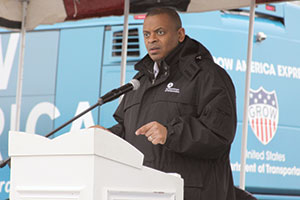Foxx Takes Bus Tour Through Southeast to Highlight Infrastructure Funding Needs

This story appears in the Feb. 23 print edition of Transport Topics.
For the second time in less than a year, Transportation Secretary Anthony Foxx toured regional infrastructure projects in a bid to press Congress to pay for new highways.
The secretary kicked off the bus trip Feb. 17 in Florida, then traveled with his team to Georgia, and the Carolinas to plug the Obama administration’s six-year, $478 billion transportation funding proposal, which Congress has yet to consider.
On Feb. 20, the secretary was scheduled to speak at an event at Union Station, in the nation’s capital, to wrap up his trip.
CAPITOL AGENDA: Talk of Long-Term HOS Suspension?
It is too early to tell what effect his campaign will have in the halls of the GOP-led Congress, where Republican leaders have not proposed a transportation funding plan. Foxx warned that if lawmakers do not approve a plan by May 31, which is when a law authorizing funding for state highway projects expires, projects nationwide wide could be halted.
“The whole country needs better quality roads, more durable bridges and the kind of large-scale repairs to America’s aging infrastructure that are only possible with federal investment,” Foxx said at the Owen Steel Co. in Columbia, South Carolina, on Feb. 18.
That same day, Vice President Joe Biden joined the secretary at the Wando Welch terminal project, which handles more than half of the cargo moving through the Port of Charleston.
“The United States ranks 28th in the world in transportation infrastructure investment. The United States shouldn’t be 28th in the world in anything,” Biden said.
The vice president also praised the agency’s Transportation Investment Generating Economic Recovery (TIGER) grant program, which is contributing to the terminal’s upgrade. In Obama’s budget request for fiscal 2016, the administration is calling for $1.25 billion for the grant program which congressional Republicans have slashed over the years.
Biden also joined Foxx on Feb. 19 in Charlotte, North Carolina, the secretary’s hometown where he served as mayor, to highlight the city’s development of a multimodal transportation center dubbed the Charlotte Gateway Station. The project calls for replacing an Amtrak station with commuter light rail service, a street car and dedicated transit bus lanes.
Foxx launched the bus tour in Florida with stops at the proposed Capital Circle Southwest project in Tallahassee and at the Overland Bridge in Jacksonville, where construction crews are replacing the structurally deficient bridge that’s on a stretch of Interstate 95.
He traveled to Savannah, Georgia, the next day to tour the Brampton Road Connector, a widening project designed to accommodate two left turn lanes into Container Gate 3 at the Port of Savannah.
That infrastructure would benefit the trucking and construction sectors as well as thousands of commuters and local economies.
The tour was a sequel to a campaign he led in the spring of 2014 to visit parts of Kentucky, Tennessee and Ohio. Back then, he also touted the administration’s transportation investment plan and called attention to a dwindling federal Highway Trust Fund.
Congress responded to Foxx’s efforts several months later by approving a 10-month, $11 billion funding stopgap for transportation programs that expires at the end of May.
The White House’s updated Grow America Act, the transportation proposal partially unveiled Feb. 2 as part of the fiscal 2016 budget request to Congress, would ensure long-term investment in public works projects spending. The Obama plan proposes a transitional 14% tax on an estimated $2 trillion in past corporate foreign profits to help fund a six-year highway bill.
Speaking to reporters days before the start of the bus tour, Foxx urged congressional action on the new Grow America Act: “If you got something staring you in the face that can get you a six-year bill that basically doubles what the gas tax is bringing in and puts you on a pathway where you can break free from some of these conventional constraints and actually deliver a system that makes life better for people and for commerce, you should take it.”
The federal tax on diesel is 24.4 cents per gallon, and 18. 4 cents a gallon for gasoline.

